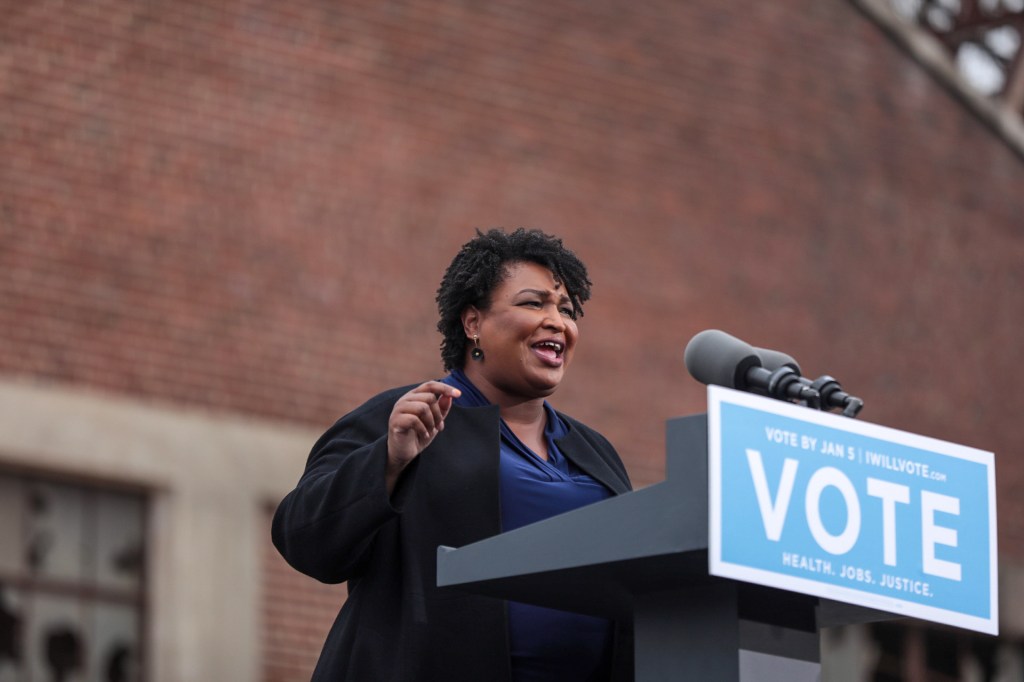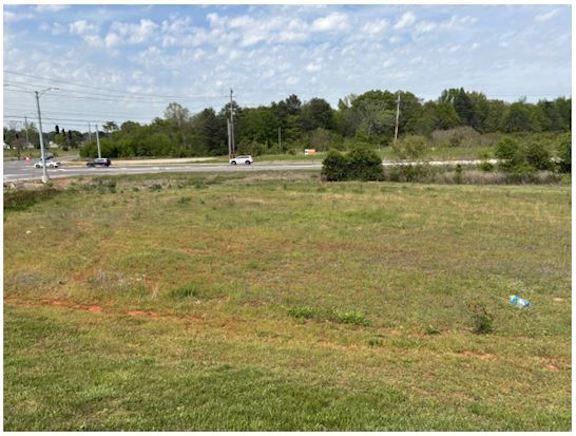Abrams expounds on Medicaid plans, Kemp shortcomings in interview
Published 5:30 pm Monday, March 21, 2022

- Stacey Abrams, former 2018 gubernatorial candidate, rallies for U.S. Senate candidates Jon Ossoff and Rev. Raphael Warnock on Dec. 15, 2020 in Atlanta.
ATLANTA —Suspending state gas taxes at the pumps is the only issue where Stacey Abrams says she and Georgia Gov. Brian Kemp agree.
The Democrat gubernatorial candidate’s priorities and plans for Georgia differ drastically from the Republican governor, whom she may face for the second time in November. Kemp faces a heated primary election in May against former U.S. Sen. David Perdue.
Trending
In a wide-ranging interview with CNHI, Abrams said one her top priorities, expanding Medicaid, has been opposed by Kemp and other Republicans in the state who instead approved smaller level expansions. They argue the state cannot afford a full expansion, while Abrams said the state has the funds to pay into it.
A full expansion of Medicaid to cover 500,000 more Georgians will cost $347 million, Abrams said.
“We will see a reduction in the uncompensated care numbers in Georgia,” Abrams explained. “Uncompensated care, which is how much we pay for people who get health care but can’t pay their bill, is $2.7 billion a year. And so Georgians are already paying for Medicaid expansion. We’re already paying for people who don’t have health care. I’m simply saying let’s bring our money home and let’s match it with the dollars that we have here.”
Georgia is one of a dozen states that hasn’t expanded Medicaid, despite federal incentives. Abrams said expanding Medicaid could have several benefits, including a decrease in health care costs, an increase in health incomes, support for rural hospitals and creating nearly 64,000 new jobs.
“Instead of cherry picking communities that would benefit from economic development, Medicaid expansion would put economic development jobs in every single region in the state,” Abrams said. “There’s neither an economic nor a partisan reason not to expand it. It’s simply bad math from Republicans.”
Abrams argues that Medicaid expansion is a “holistic” solution to driving Georgia’s economy through job creation and expanding health options to rural areas where options are scarce.
Trending
“If you’re a small town, if you’re a rural county, you can’t attract a factory to your town. … If somebody gets hurt, they can’t go and get help. No one’s going to bring a job to a place where they know their workers can’t live and can’t work, so we need to build a public health infrastructure as an economic development driver.”
If elected governor, Medicaid expansion and funding education will be issues she wants to tackle her first 100 days. The two topics are key elements of her “One Georgia” tour that kicked off earlier this month.
Abrams emphasized the importance of having services to help students recover academically, mentally and socially from the effects of the COVID-19 pandemic, and investing in teachers and school staff salaries to aid in shortages in the profession.
Education funding should always be a priority, she said, while calling Kemp’s recent education budget expansions an election year ploy. An amended Fiscal Year 2022 budget signed by Kemp this month restores school austerity cuts made during the COVID-19 pandemic and gives school employees the second payment ($2,000) of a $5,000 raise promised by Kemp during his 2018 gubernatorial campaign.
“The governor couldn’t do this for three years but the year that he runs for reelection he suddenly finds this belief that we should invest in education,” Abrams said. “I believe that all along, if you look at my record in the legislature, you’ll see that I’ve always fought for education funding, and as governor, I will deliver it.”
Abrams said she plans to deliver on the state’s plans to implement broadband access, especially in rural communities. Making broadband affordable to residents will be her priority, she said.
She acknowledged Georgia U.S. Sens. Raphael Warnock and Jon Ossoff’s work in securing $130 million in federal funding to expand broadband in Georgia.
“We know that in so many rural communities, we have poverty levels of almost 30 percent, so it’s not enough to say that we’re going to bring broadband to the community. We also have to make broadband affordable and that’s going to be my focus,” she said. “We have to make certain that we don’t just bring broadband to the places that voted for the governor. My mission is going to be to make sure that we have a transparency plan so that everyone knows where broadband is going and that we’re providing coverage opportunities to every community.”
In the largely Republican-controlled state legislature, Abrams said her previous seven years of experience as the House Minority Leader — the first Black person to hold the role — has prepared her for the larger role of governor. If elected, she would also be the first Black female governor in the country.
Abrams referenced her leadership in passing the Transportation Act of 2012, her sought-after sponsorship of tax bills due to her experience as a tax attorney and what she calls her proudest work: her role in developing Kinship Care, a program that aids family members who are caring for another relative’s child.
“I remain incredibly proud of the fact that I was able to work with Republicans and Democrats, work with a Republican governor to build an office and his administration to focus on Kinship Care … to take care of our most fragile and vulnerable Georgians,” Abrams said. “On a host of metrics from education to transportation, to the environment to the economy, I’ve worked closely with Republicans to get good done and I will do that as governor of Georgia.”
Despite her 2018 loss to Kemp in the gubernatorial race, Abrams remained busy.
She founded Fair Fight, a national voting rights group rooted in Georgia, through which its political action committee donated $1.34 million to pay off medical debt for residents in five states — including 68,000 Georgians.
Abrams said she helped spread access to the COVID-19 vaccines, delivered food to food banks and provided small businesses with resources during the pandemic.
“That’s what I did without the title and that’s the work,” Abrams said. “I did it because I believe in Georgia and I simply want the opportunity to expand the reach of the work that I know needs to be done and to work in partnership with Georgians to move our state forward.”
As of the Jan. 31 reporting period, Abrams had $7.2 million of cash in just two months of announcing her campaign Dec. 1. Up to the same period, Kemp had $12.7 in cash during the course of six months. Perdue had reportedly raised $1 million.
Perdue, backed by former President Donald Trump, has marketed himself as the only candidate who can defeat Abrams. Both Perdue and Trump have called Kemp a failure to the Republican party, stemming largely from Kemp’s failure to adhere to Trump’s requests to overturn the state’s 2020 election results, which helped tip Democrat President Joe Biden to victory.
Trump’s 2020 loss resulted in Georgia becoming a swing state and led to state lawmakers around the country enacting new voting laws that Democrats have argued make it harder to vote.
“I would work with the legislature to revisit what we did right in 2020 that increased voter turnout and increase the success rate of voters having their vote counted because this is not a partisan issue at all,” Abrams said. “The apparatus of voting should work for everyone everywhere. And I would do my best to make certain that we are working with folks from across the state to make sure counties have the resources they need to run safe and fair elections.”
CNHI has also extended offers to interview Kemp and Perdue regarding their campaigns for governor.





